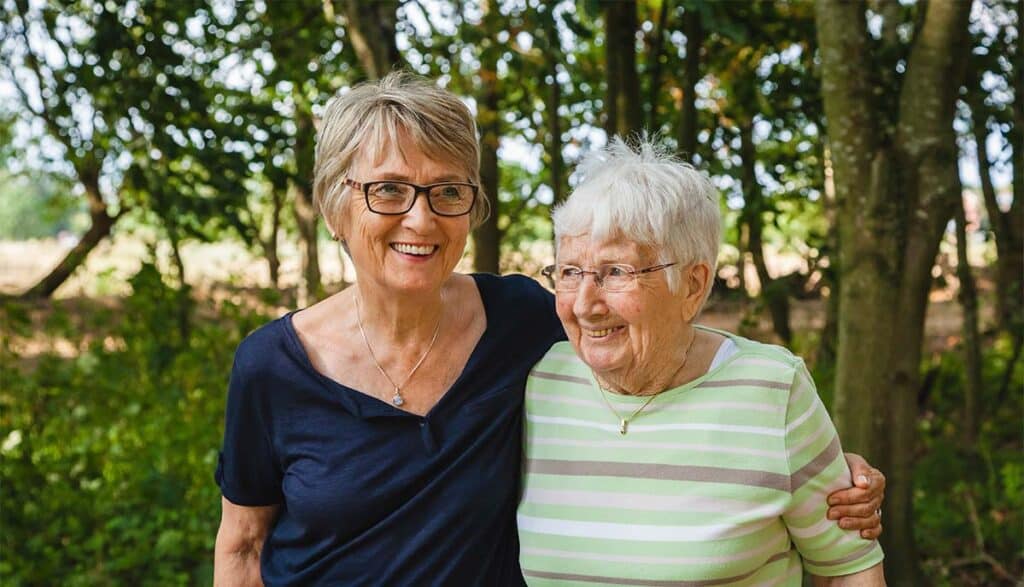Watching a loved one go through the various stages of Alzheimer’s or dementia can be heart-wrenching. As their memory, abilities, and personality change, you may wonder how to provide comfort and support.
How do you ensure your family member feels secure, loved, and cared for throughout this journey?
Continue reading to learn more about each stage of Alzheimer’s and how to provide comfort and care.
These suggestions are inspired by our Alzheimer’s care program in Spokane, WA at South Hill Village. Our Connections memory care community supports seniors and family members on the journey of Alzheimer’s or dementia.
First Stage of Alzheimer’s: Early Changes
In the first stage of Alzheimer’s, your loved one may experience mild cognitive impairment. This can manifest as:
- Forgetfulness
- Difficulty concentrating
- Struggling to find the right words
They may also face emotional challenges such as anxiety, depression, and loneliness. People with dementia may begin to realize something is not quite right before diagnosis. Loved ones may try to hide from social situations or recoil from favorite activities.

To provide comfort during this stage, it is essential to:
- Maintain open communication
- Offering reassurance and understanding
- Encourage your loved one to engage in activities they enjoy
- Facilitate socializing with friends and family
- Providing a stable and familiar environment to help alleviate anxiety and stress
Second Stage of Alzheimer’s: Middle Stage Challenges
As Alzheimer’s or other forms of dementia progress into the middle stage, your loved one may experience:
- More significant memory loss
- Forgetting the names of close friends and family members
- The need for additional supervision to prevent wandering
Sundowning is a phenomenon where confusion and agitation may also occur in the late afternoon and evening. Additionally, mobility changes can make daily activities more challenging and increase the risk of falls. Living independently becomes much harder to manage.
During this stage:
- Providing a structured routine can help to minimize confusion and agitation.
- Ensure the home environment is easy to navigate, with proper lighting and clear walkways.
- Use notes, labels, and reminders to guide a loved one who may spend time alone during the day.
Engaging your loved one in meaningful activities and maintaining social connections can also help provide comfort and a sense of purpose. Memory care facilities in Spokane are often a resource for assisted living.
At this point, it may be time to consider memory care services. Caregiving is often a full-time job for family members when a loved one has middle-stage dementia. Our dementia care specialists in Spokane understand how to support seniors through each stage of memory loss.
Final Stage of Alzheimer’s: Loss of Independence
In the final stage of Alzheimer’s, a loved one may lose the ability to communicate or move independently. They may require assistance with all aspects of daily living and become more vulnerable to infections and other health complications.
Providing comfort during this stage involves physical touch, soothing music, and a peaceful environment. Maintaining a consistent routine and ensuring personal care needs are met with dignity and respect is also crucial.
Connections Memory Care at South Hill Village
At South Hill Village, our award-winning Connections memory care program, developed by Dr. Sandra Petersen, focuses on three key elements:
- Connecting
- Moving
- Learning
Incorporating these components into daily routines encourages healthy brain activity and promotes neuroplasticity to slow memory loss.
Our team members provide personalized care, socialization, and purposeful activities to ensure each resident feels comfortable and supported. We are a leading provider of Alzheimer’s care in Spokane, Washington. The team is committed to enhancing the quality of life for seniors with Alzheimer’s and dementia.
Caring for a loved one with Alzheimer’s can be challenging, but providing comfort and support through each stage of the disease is essential. By understanding the changes they’re experiencing and seeking professional Alzheimer’s care in Spokane when needed, you can make this journey more manageable for you and your loved one.
Discover Comforting Alzheimer’s and Dementia Care in Spokane, WA
Contact us to learn more about providing comfort and care at every stage of dementia. We’re here to help older adults and their families.
